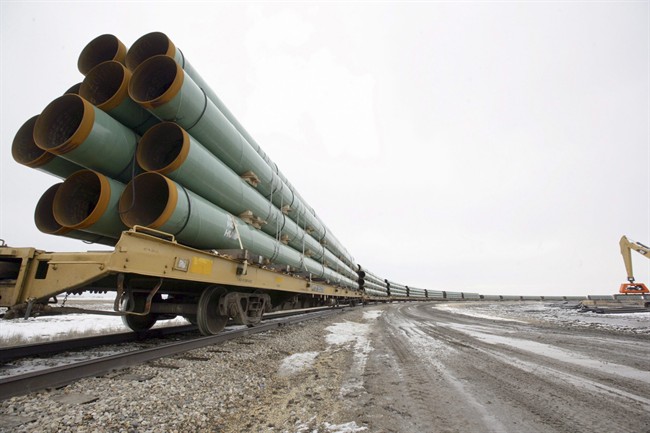VANCOUVER – While unveiling what he calls “a plan to lead the world in a coordinated assault” on climate change, President Barack Obama said the Keystone XL pipeline should only be approved if it meets U.S. greenhouse gas emissions standards.

Speaking at Georgetown University, Obama said the project must be in the country’s national interests and not “exacerbate the problem of carbon pollution.”
“I know there’s been, for example, a lot of controversy surrounding the proposal to build a pipeline – the Keystone pipeline – that would carry oil from Canadian tar sands down to refineries in the Gulf,” Obama said.
“The net effects of the pipeline’s impact on our climate will be absolutely critical in determining if this project will be allowed to go forward.”
Approval of the proposed pipeline, to transport heavy crude from Alberta’s oil sands to Texas Gulf Coast refineries, remains on hold with approval depending on a final State Department review of the project.
A decision is expected by this fall.
Read more: Washington D.C. public spaces become battleground for Keystone XL debate
Calgary-based TransCanada said its $5.3-billion project would be the best option to transport Canadian oil to U.S. markets and not have an impact on the climate.
“If Keystone XL is not built, it’s clear that the oil will move to market by truck, rail and tanker, which will significantly add to global greenhouse gas emissions to move the product,” TransCanada spokesperson Shawn Howard said in a statement following Obama’s address.
“In addition, the pipeline will operate with virtually no emissions and will have a limited impact on all of the resources along the pipeline route,” Howard’s statement added.
The State Dept. review last spring was in line with what TransCanada said, in that respect.
But Canadian climate scientist Dr. Danny Harvey, of the University of Toronto’s Geography and Planning Dept., said you have to consider all emissions produced as a result of the oil sands – from extraction to exhaust pipe.
“Eighty per cent of emissions are at the point of use,” he said. “Anything that is expanding emissions and expanding operations is going in the wrong direction.”
While he said there needs to be move toward limiting oil consumption, to meet emissions targets, he added there also needs to be a “supply and demand match.”
Read more: Clean vs. dirty: The great Alberta oil debate
Read more: Introduction to 37 years of oil spills in Alberta
Obama, in his action plan, aims to reduce the reliance on heavy fuels and increase usage of biofuels and natural gas.
“Since heavy-duty vehicles are expected to account for 40 per cent of increased oil use through 2030, we will encourage the adoption of heavy duty natural gas vehicles as well,” the President outlined in his plan.
Producing more fuel, from a lower quality source of oil, is not going to meet Obama’s goals, Harvey said.
On top of that, he said, it’s a much more intensive process to raise the quality of Alberta crude, before sending it to market.
Even shale oil, despite the environmental concerns that go with its extraction, is a better than Alberta oil, Harvey said.
“You really wouldn’t use that fuel unless you have no alternatives,” he added.
TransCanada, in its email statement, did not address the issue of emissions produced at the point of extraction or when used by consumers, but highlighted its investments in “emission-less” energy, including its contribution to wind and solar projects.
*With files from The Associated Press


Comments